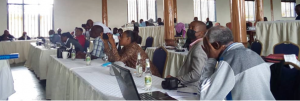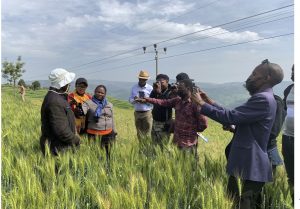Kigali, Rwanda; February 2022; – Rwanda has made significant efforts to respond to the impacts of environmental and climate change issues. Efforts continue to be made to inculcate environmental awareness to ensure communities are mindful and knowledgeable about the environment and environmental problems. To make environmental laws, policies, strategies, and institutional capacities more effective towards sustainable environmental development, the current situation calls for participation of mass media. However, currently the media allocate little space and resources to the environment, prioritizing rather political, social, and economic issues over environment and climate change matters. The environment and climate change issues are a crosscutting that, if not well handled, affect all the above. There is limited understanding about why the environment matters for every sector, mostly within the local media. Even when such space is allocated to the environment sector reporting, stories mostly focus on events or calamities – rather than in-depth reporting on issues related to the environment and efforts made by the government of Rwanda to address these issues in terms of adaptation and mitigation.
The government of Rwanda is committed to green growth and low carbon development toward a carbon zero economy by 2050. It is reassured by its strategic planning – vision 2050 and the on-going implementation of the Green Growth and Climate Resilience Strategy – 2050 (GGCRS). Rwanda has ratified environmental management and climate resilience global commitments and has submitted its Nationally Determined Contributions (NDC) to Paris Agreement. The medium-term strategic plan – National Strategy for transformation (NST1 – 2024) and related sector strategic plans and district strategic plans are developed to implement provisions of the vision 2050 and GGCRS at national and local levels. The commitment is also strengthened by regulatory and institutional frameworks including the establishment of Rwanda Environment Management Authority (REMA) with legal mandate for national environmental protection, conservation, promotion, and overall management, including advisory to the government on all matters pertinent to the environment and climate change. It aims to promote and ensure the protection of the environment and sustainable management of natural resources through decentralized structures of governance and seek national positions on emerging global issues with a view to enhancing the well-being of the Rwandan people. Its vision states that all sectors of the Rwandan society value and undertake sound environmental management and rational use of natural resources to contribute to the national aspirations for sustainable development. REMA’s responsibilities include to prepare, publish, and disseminate education materials relating to guidelines and laws relating to environmental management and protection and reduce environmental degradation risks. Different stakeholders are mobilized and sensitized to join the cause and adherent to the strategic orientation. These include Non-Governmental Organization both local and international, the civil society, academic researchers, and the media. The latter is expected to play a bigger role in community outreach and engagement.

In this regard, Rwanda Environment Management Authority (REMA) in collaboration with The Global Green Growth Institute (GGGI) and Rwanda Green Fund (FONERWA) through implementation of the GCF readiness project organized a four day training with main objective to develop the capacity of journalists to use mass and social media with increased and improved investigation and reporting on green growth and climate change. The beneficiaries of these series of training are mainly members of the Rwanda Environmental Journalists (REJ) at National and local levels, public or private and other journalists at national and local levels, public or private reporting on or willing to improve their reporting on matters pertinent to promotion of green growth and climate resilience in Rwanda – planned interventions, roles of the community, and achievements made so far.
Sixty (60) journalists representing different media houses are gathered in Gicumbi District – Urumuri Hotel where they discussed key environmental management and climate change topics including but not limited to:
- Understanding the Environment management and climate change adaptation and mitigation concepts
- Global commitments for Environment management and climate change adaptation and mitigation
- Rwanda commitments to Environment management and climate change adaptation and mitigation
- Government of Rwanda’s achievements in Environment management and climate change adaptation and mitigation
- Ethical investigation and reporting the Environment management and climate change adaptation and mitigation
A field visit to government led initiative for environmental management and climate change community adaptation projects was done to demonstrate efforts made by the government and its development partners and stakeholders to address issues concerning the environment and impact of the changing climate. Moving forward and to assess the training outcomes, journalists will undergo a pitching exercise whereby they will write and document achievement made by different sectors in the implementation of the GGCRS.
Watch the highlights video from each day training:
